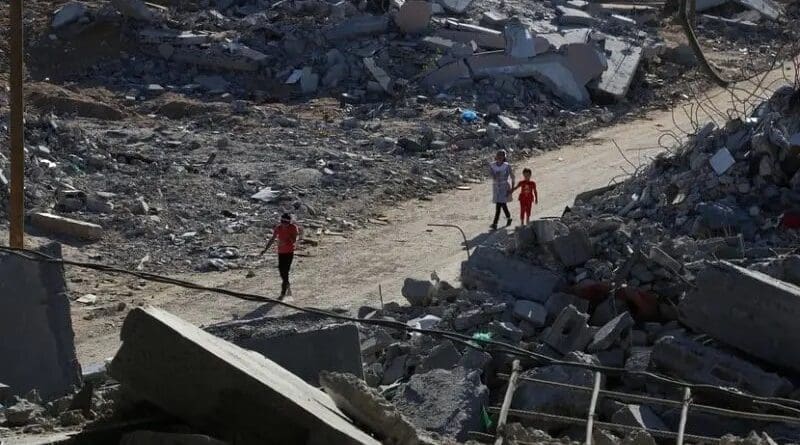All Quiet On The Gaza Front? – OpEd
On November 16, 2018 Israel entered into a ceasefire arrangement with the de facto rulers of the Gaza strip – Hamas. It seems to be holding.
Nothing is more surprising than that calm should have descended on Gaza at this particular moment. For on Sunday evening, 11 November, a vehicle containing Israeli soldiers sped across the border into Gaza. In the warren of back streets in Khan Younis, a town in the south of the Gaza strip, it was challenged at a checkpoint, and an armed conflict ensued. According to some media reports the Israeli team were members of the élite Maglan unit, which specializes in slipping behind enemy lines to collect intelligence or destroy targets.
The exact sequence of events is unclear, but early on an Israeli lieutenant colonel was shot dead, and before too long seven Palestinians, including Nour Barakah, the Hamas commander for Khan Younis, had also been killed. The Israeli soldiers were extracted by helicopters of the Air Force’s Unit 669, taking with them the dead officer – reportedly a member of Israel’s Druze community – and an injured comrade.
The day after the botched operation Hamas fired more than 450 rockets and mortar shells at Israel. Israel responded with heavy airstrikes during which 14 Palestinians were killed and about 35 wounded, some residential property was destroyed and the building occupied by the Al-Aqsa TV satellite station was demolished.
And yet, less than 48 hours later, an Israeli-Hamas truce had been agreed and was in operation.
It is obvious that agreements as delicate as this cannot be arranged overnight. They must be the result of weeks, if not months, of complex negotiation. Israel and Hamas were certainly parties to the deal, but other principal players were Egypt and the UN Special Coordinator for the Middle East Peace Process, Nickolay Mladenov. Qatar’s financial support for the Hamas administration was undoubtedly a factor.
The ceasefire announcement set off celebrations in Gaza City with hundreds of Palestinians taking to the streets. The Hamas line was that the months of protest along the Gaza-Israel border had reduced Israel to begging for a ceasefire. and that this was a great victory. The claim came in response to Israeli prime minister Benjamin Netanyahu’s statement that Hamas rulers “begged for a ceasefire and they know why.”
Palestinian Authority president Mahmoud Abbas, on the other hand, was reportedly furious, fearing that the deal would consolidate Hamas as the de facto government of Gaza, and negate his continuous efforts to re-establish PA control in the Strip. This would certainly be the outcome if other rumoured details of the agreement are correct, such as Hamas gaining access to a port of its own and a relaxation of Israel’s economic embargo.
Even more worrying for Abbas, the PA and its ruling Fatah faction was their growing suspicion that somehow the ceasefire is linked to US President Donald Trump’s long-awaited Middle East peace plan – reportedly cut and dried and only awaiting the opportune moment to be rolled out. Abbas rejected “the deal of the century”, as Trump has dubbed it, sight unseen, and also the US as an acceptable peace broker back in December 2017, in reaction to Trump’s recognition of Jerusalem as Israel’s capital. Now he accused Hamas of being in “collusion” with Israel and the US administration to implement the plan which, the PA claims, is aimed at separating the Gaza Strip from the West Bank.
Husam Badran, a member of Hamas’s political bureau, dismissed the charge. “Linking these understandings to the ‘deal of the century’ is a lie,” he said, “spread and believed by some.”
Abbas must be feeling immensely frustrated by the events of the past few weeks. According to the Oslo Accords, the PLO is the “sole legitimate representative of the Palestinian people,” and the only party authorized to reach a truce with Israel. Yet he had been cut out of the negotiations that Israel, Egypt, the UN and Qatar have been conducting directly with Hamas. Moreover he was further marginalized when Qatar handed over $15 million in cash, enabling Hamas to pay the salaries of thousands of its supporters. Abbas had severely reduced funding to Hamas, in an effort to regain some sort of control over the Strip. In response to the delivery of the money over his head, Abbas hinted that he was considering new sanctions. As a result Abbas is being perceived as the bad cop intent on punishing Gaza, while others are trying to end the crisis – a risky strategy which could result in his complete marginalization in future peace negotiations.
How firmly based is the Israeli-Hamas deal? It led to a political crisis inside Israel, exemplified by the resignation of Defense Minister Avigdor Lieberman, who represented the view that the ceasefire simply handed Hamas a breathing space in which to rearm in readiness for the next full-scale conflict. His critics accuse Netanyahu of wanting to perpetuate the status quo, that is no war, no peace, and no resolution of the Palestine issue.
Other more sympathetic commentators believe that Netanyahu wanted a calm Gaza in order to pursue a weightier strategic policy. One arm of this, possibly related to the eventual unveiling of Trump’s peace plan, is to continue improving relations with a range of Arab countries, including Saudi Arabia and the Gulf states. Another is to foster better relations between Israel and the wider world. His own visit to the Sultan of Oman on 27 October, and the historic first-time visit to Israel of the President of Chad, Idriss Deby, on 23 November, are two recent examples (neither Oman nor Chad formally recognize Israel).
Peace is certainly better than conflict, but how long will the current preference of both Israel and Hamas for a cessation of hostilities outweigh their other long-term strategic objectives? Peace hangs in the balance on the Gaza front.

